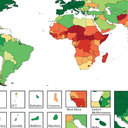Assessment of air pollution stress on some commonly grown tree species in industrial zone of Durgapur, West Bengal, India.
Keywords
Abstract
The present study deals with the biochemical responses of some selected tree species with respect to increased air pollution in Durgapur industrial city in India. Areas in vicinity to industries possess very high concentrations of suspended particulate matter (571 microg/m3), SOx (132 microg/m3) and NOx (97 microg/m3) which shows significant correlations (p < 0.05) with the biochemical constituents of stressed plants. Plants growing in industrial zone exhibit a considerable decline in total chlorophyll (34.97-59.81%), soluble sugars (23.85-33.16%) and protein content (21.59-47.13%) and increase in ascorbic acid (81.87-238.53%) and proline content (123.47-284.91%). Of the studied tree species, Shorea robusta (9.78 +/- 0.095), Alstonia scholaris (8.76 +/- 0.084), Peltophorum pterocarpum (8.99 +/- 0.13) and Albizia lebbeck (7.71 +/- 0.012) were found to be more tolerant with higher Air Pollution Toblerance Index (APTI) and Tectona grandis (6.13 +/- 0.276), Lagerstroemia speciosa (7.075 +/- 0.18) and Delonix regia (6.87 +/- 0.079) were sensitive with lower APTI values. Therefore, plant species with higher APTI value, being more resistant, can be used as pollutant absorbent to reduce the pollution level and are suitable for plantations in industrial areas.



